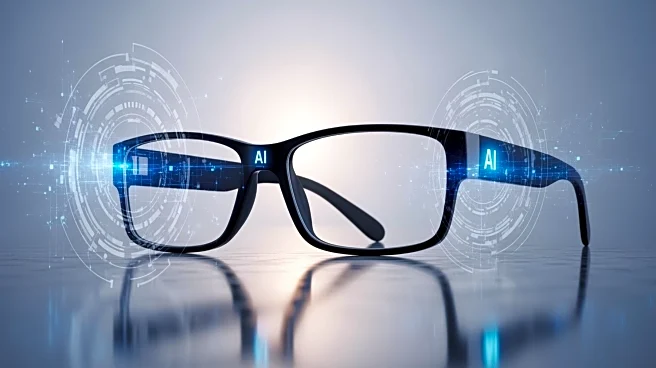What's Happening?
During a recent earnings call on July 30, 2025, Mark Zuckerberg, CEO of Meta, made a statement suggesting that individuals without AI-enabled glasses could face significant cognitive disadvantages. This
remark has sparked widespread debate about the implications of AI wearables in the workplace. The statement has been linked to rising sales of smart glasses and significant financial losses for Reality Labs, Meta's division focused on augmented and virtual reality. The comment has intensified discussions among tech leaders, unions, and investors about the potential for hardware-driven inequality in the job market. The debate centers on whether employees will be expected to purchase these devices to remain competitive in their roles.
Why It's Important?
The introduction of AI glasses as a potential workplace requirement raises significant concerns about privacy, cost, and surveillance. Employers may see these devices as tools for enhancing productivity and training, but labor advocates warn of the creation of a two-tier workforce. The financial burden of purchasing such technology could fall on employees, exacerbating existing inequalities. Additionally, the rapid growth in AR/VR shipments, projected to increase by 39.2% in 2025, indicates a strong market demand that could further pressure companies to adopt these technologies. The situation presents a complex challenge for businesses, which must balance technological advancement with ethical considerations and employee rights.
What's Next?
As companies consider integrating AI glasses into their operations, they will need to address legal and privacy concerns, including consent, data retention, and compliance with surveillance laws. Employers may face pressure to subsidize these devices or risk potential backlash from employees and labor groups. The coming months are likely to see policy debates and the development of new company expense rules and HR guidelines. The outcome of these discussions could shape the future of workplace technology and employee rights, determining whether AI glasses become a standard tool or remain optional.
Beyond the Headlines
The broader implications of mandating AI glasses in the workplace include potential shifts in corporate culture and employee relations. The requirement for always-on, camera-equipped wearables could lead to increased monitoring and data collection, raising ethical questions about employee privacy. Additionally, the integration of AI technology into everyday work could redefine job roles and expectations, potentially leading to new forms of workplace discrimination. As companies navigate these challenges, they must consider the long-term impact on their workforce and the potential for regulatory intervention.










